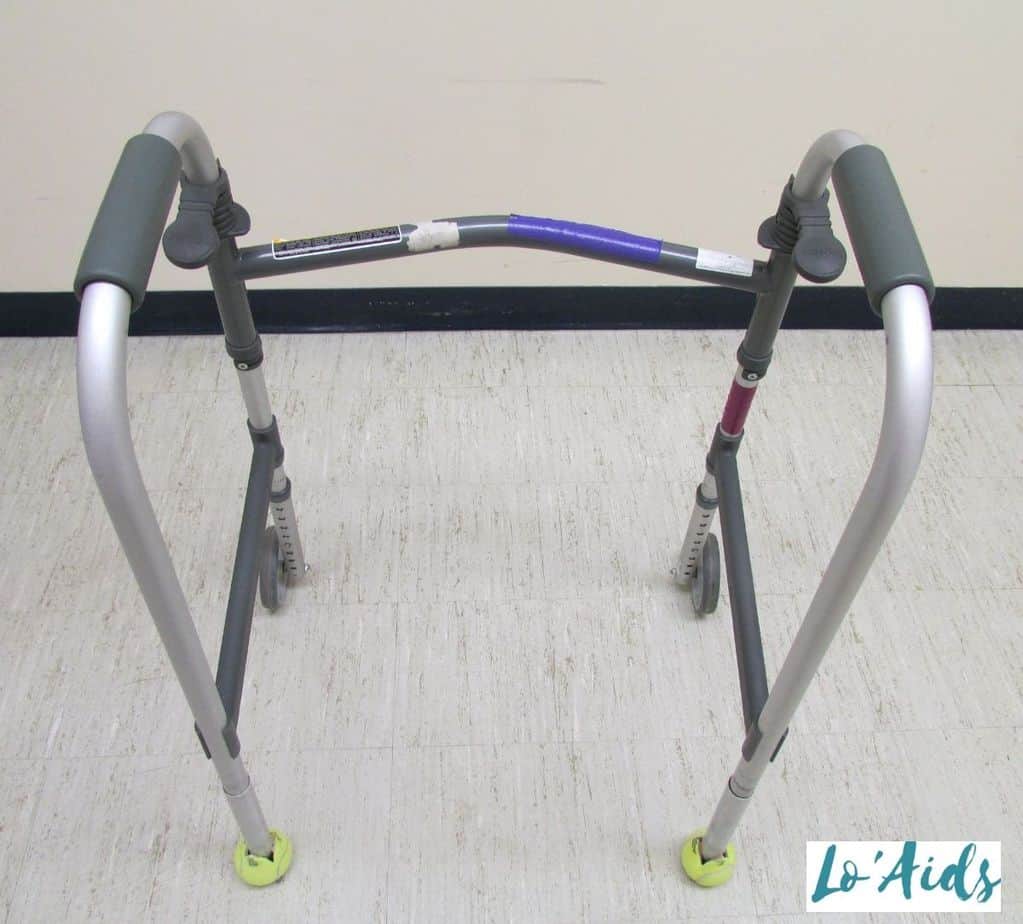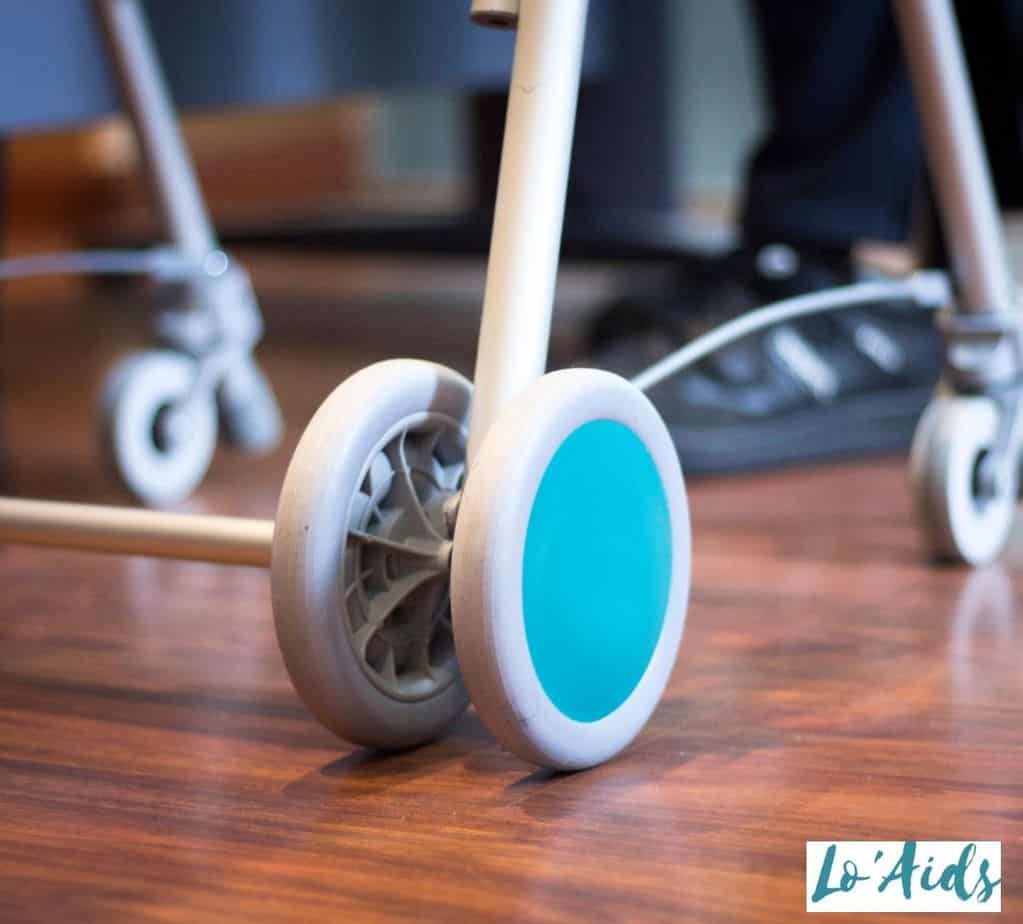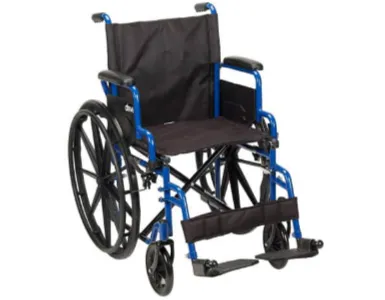How much does a walker weigh?
Are you curious about it?
The weight matters and impacts the user.
After concluding experts and research, I have the answer.
So, read to learn more.
Table of Contents
How Much Do Upright Walkers Weigh?
Wondering how much does an upright walker weigh?
An upright walker for the elderly is designed to increase users’ independence and improve their walking ability. They are referred to as conventional walkers, traditional walkers, or rehab walkers.

They usually have two legs that extend straight out in front with a handle on top for the user to hold onto. The average weight for an upright walker is about 8 pounds.
These traditional walkers are usually weighed this way because many people use them, made out of metal or other sturdy material.
But depending on the walker, the product weight may vary.
CHECK: Vive Health Upright Walker Review
Comparing Different Walker’s Weight
There are many types of walkers for the elderly, and with so many different brands and item models on the market, it can be hard to decide. But have no fear! [1]
Here is a list and comparison table of premium quality products with varying weight capacities.
| Product | Weight | Price | Description |
| McKesson Lightweight Rollator – Walker with Wheels, Seat, Removable Storage | 15 lbs | $91-$102 | The McKesson Lightweight Rollator is an excellent option for a durable walker that doesn’t weigh too much. It has a comfortable seat and height-adjustable dimensions for the user’s comfort. |
| KMINA PRO – Lightweight Rollator Walker | 12 lbs | $219 | If you’re looking for a rollator walker that’s easy to maneuver, look no further than the KMINA PRO. This lightweight rollator is perfect for indoor and outdoor use. This is thanks to its narrower design, even in tight spaces. |
| Amazon Drive Medical Heavy Duty Nitro 20.5 Heavy Duty | 27.8 lbs | $379.99 | This Amazon Drive Medical Heavy Duty Nitro comes with larger wheels and advanced features. This rollator is designed for a stable, smooth experience. Plus, its modern design speaks volumes! |
| Medline Industries Heavy Duty Bariatric Rollator | 41 lbs | $104.12 – $119.99 | The Medline Heavy Duty Bariatric Rollator is an excellent option for those needing a heavier-duty walker. With a weight capacity of 500 pounds, this rollator can accommodate almost anyone. Plus, it features a padded seat and shopping basket for added convenience. |
| Stander EZ Fold-N-Go Walker | 8 lbs | $134.99 | The Stander EZ Fold-N-Go Walker is perfect for looking for a lightweight, easy-to-use walker. Weighing in at only 8 pounds, this walker can be transported and stored. |
The products I listed above belong to different brands, but they made my HONORABLE list because of their features, durability, current price, and excellent product description.
They are the giants in the rolling walkers market, and thus, I couldn’t help but put them up against each other, but with good reasons!
TRY READING: How Do You Stand Up in a Walker?
What Consists Of Your Walker’s Weight?
Now that you know the average weight for different types of walkers let’s take a look at what makes up the weight of your walker!
According to the American Occupational Therapy Association (AOTA), the weight of a walker consists of the essential parts that make up the structure [2].
These parts are listed below:
Frame Size
The width of the walker frame will determine how much weight the walker can support.

A wider frame means that the walker can support more weight, while a narrower frame can only support a lighter person.
Frame Materials
The walker’s frame can be made out of a variety of materials, including metal, plastic, and wood. So, the walker’s weight will depend on the material used.

A lightweight walker and portable walker will usually have a metal frame, while a bariatric walker will have a more robust, more durable frame made of wood or plastic.
Features And Accessories
Some walkers come with features and accessories that can add to the weight. These features can include grip brakes, a basket for convenient storage, adjustable height, and more!
Other accessories may include a beverage holder, oxygen holder, or umbrella holder that can also contribute to weight.
Wheels
The wheels on the walker also play a role in how much it weighs. A three-wheel design will be lighter than a 4-wheeled rolling walker [3].

The material used for the wheels will also affect the weight, with rubber being the heaviest option.
Seat Height
According to the Mayo Clinic, the height range of the seat on the walker can affect how much it weighs. A taller seat height will add more weight, while a lower seat will lighter the walker [4].
If you’re in the market for a walker, our comprehensive guide offers useful tips and insights on how to choose the right one for your needs. Don’t miss our article on “How to Choose a Walker” for valuable information to help you make an informed decision.
How To Choose The Right Weight For Your Walker
One of the main factors that will determine the weight of your walker is the weight limit. This is the maximum weight that the walker can support, and it’s essential to make sure that you stay within this limit.

For instance, an upright walker for seniors has a weight limit of 250 pounds, while bariatric walkers can support up to 500 pounds.
A lightweight design and lightweight models of walkers are also available for those who don’t need a lot of support. These walkers weigh 8 pounds or less, making them easy to transport and store.
Choosing a walker is easy if you know what you want and your budget. The weight factors above are essential to know to make the right choice for yourself.
Additionally, there are some factors that you need to consider that will contribute to the weight, such as the material and other features. Walkers are made for elderly or disabled people to have improved mobility, so pick the one that fits your needs.
FAQs
What is the lightest weight walker available?
The lightest weight walker available is the Drive Medical Ultra Lightweight Walker, weighing 8 pounds.
How much does a four-wheel walker weigh?
A 4 wheel walker usually weighs between 10 and 12 pounds. This is because they have a larger frame and more stability.
How much does a rollator walker weigh?
The average weight for a rollator walker is around 14 pounds. But, they can weigh anywhere from 10 to 22 pounds.
How much does a Medline walker weigh?
It varies, but the Medline bariatric walker weighs 32 pounds for your reference, but their standard walker weighs from 5 to 7 pounds.
Conclusion
That’s it! Now you know everything there is to know about the weight of walkers. Remember that the weight will vary depending on the design, material, and features.
So, it’s essential to choose one that fits your needs and is within the weight limit. If you’re still not sure which walker is right for you, ask your doctor or physical therapist for help.

How much does a walker weigh? Please share it with us if you’ve found an answer before coming here.
References
- https://www.healthline.com/health/best-walkers-for-seniors#how-we-chose
- Bachschmidt, R. A., Harris, G. F., & Simoneau, G. G. (1996, March). Development of an instrumented walker for measurement of unilateral hand loads. Proceedings of the 1996 Fifteenth Southern Biomedical Engineering Conference (pp. 53-55). IEEE.
- https://medlineplus.gov/ency/patientinstructions/000342.htm
- https://www.mayoclinic.org/healthy-lifestyle/healthy-aging/multimedia/walker/sls-20076469?s=3





